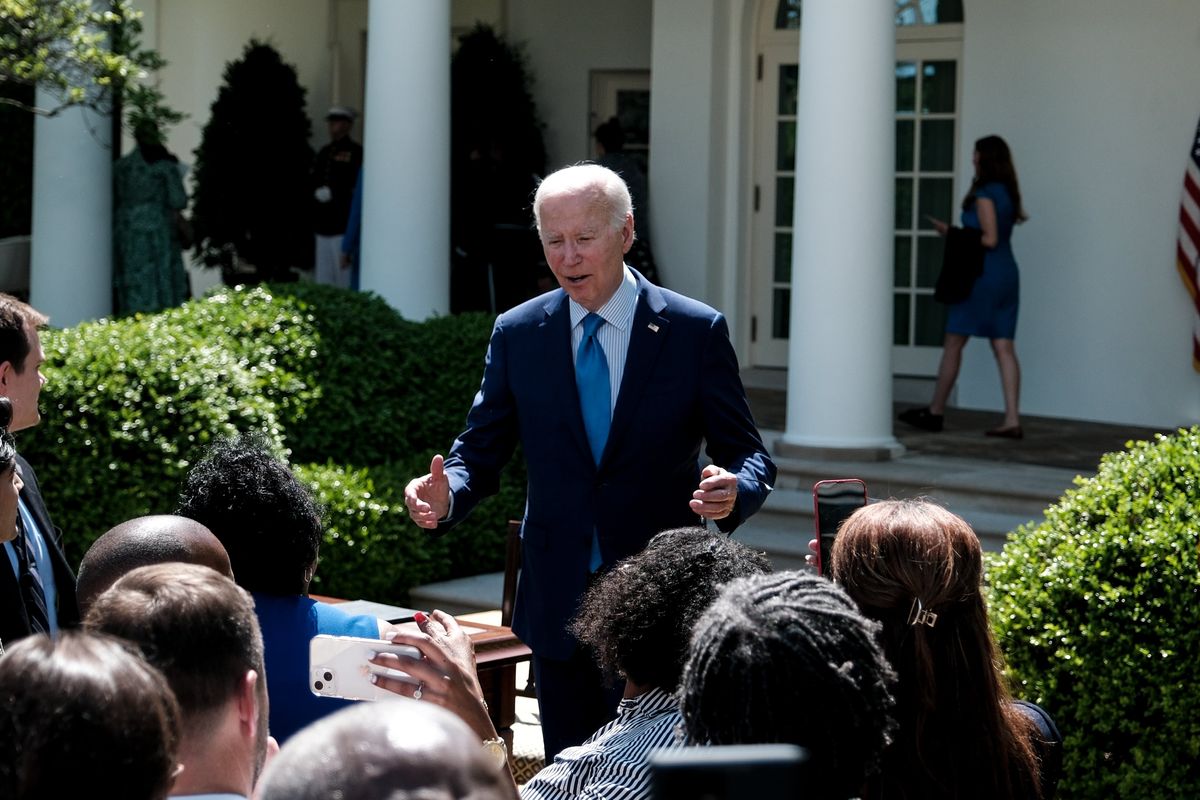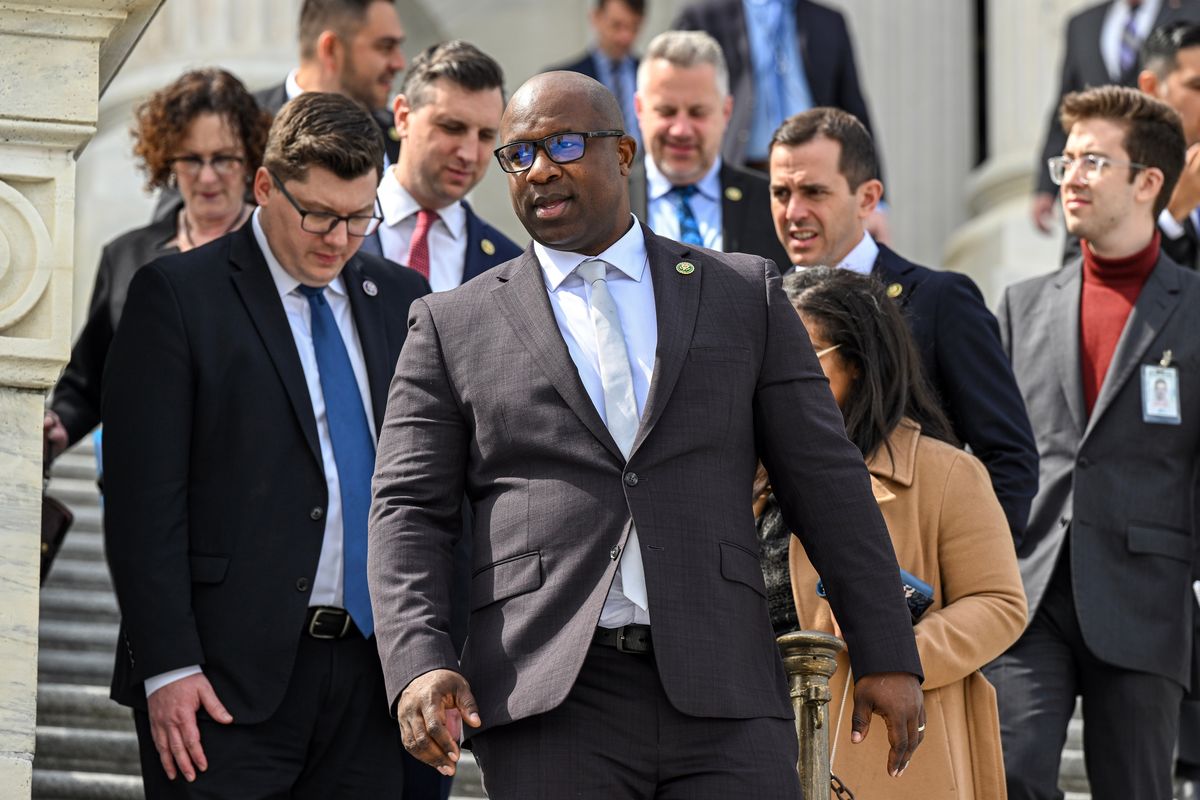How Democrats learned to cast aside reservations and embrace Biden 2024
President Joe Biden speaks to reporters at the White House in Washington, D.C., on Friday. (New York Times)
As President Joe Biden nears the formal announcement of his 2024 re-election bid, one of the most important developments of the campaign is something that hasn’t happened at all: No serious primary challenger has emerged.
Biden has all but cleared the field despite concerns about his age – at 80, he is the oldest U.S. president in history – and the persistent misgivings about the president held by a large number of the party’s voters. Democrats yearn for a fresh face in 2024, according to repeated polls; they just don’t know who that would be.
After Democrats won more races than expected in the 2022 midterm elections, any energy to challenge Biden quickly dissipated. The left has stayed in line even as Biden has lately made more explicit appeals toward the center. And would-be rivals have stayed on the sidelines.
The early entry of Donald Trump into the race immediately clarified that the stakes in 2024 would be just as high for Democrats as they were in 2020. The former president has proved to be the greatest unifying force in Democratic politics in the last decade, and the same factors that caused the party to rally behind Biden then are still present today. Add to that the advantages of holding the White House, and any challenge seemed more destined to bruise Biden than to best him.
Plans are in place for Biden to formally begin a 2024 campaign as early as Tuesday with a low-key video timed with the anniversary of his campaign kickoff four years ago. It is a rollout that many Democrats are greeting more with a sense of stoicism than enthusiasm.
“We need stability,” said Rep. Jamaal Bowman of New York, a progressive who won his seat in 2020 by ousting an older, more moderate incumbent in a primary. “Biden provides that.”
Skating to a second nomination was not always guaranteed. Biden, as the incumbent president, was obviously the prohibitive favorite. But people close to the White House have been surprised at the speed with which the full spectrum of the party has gone from hand-wringing about Biden to almost unanimous acclamation, at least in public.
Maria Cardona, a Democratic National Committee member and party strategist, has been confounded by the doubts around Biden as the Democrats’ best bet, especially against a 76-year-old Trump, who remains the Republican front-runner.
“Regardless of the reservations, regardless of the worry that he is getting up there in age – and he is, and that is going to be a question that he and the campaign are going to have to contend with – when his counterpart is almost as old as he is but is so opposite of what this country deserves, then it’s a no-brainer,” she said.
For now, the only announced challengers to Biden are Marianne Williamson, whose last run amounted to an asterisk in the 2020 campaign, and Robert F. Kennedy Jr., who is leveraging his family name to promote his anti-vaccine views.
“Democrats complain that he might be too old,” Cardona added. “But then, when they’re asked, ‘Well, who?’ There is no one else.”
Prominent and ambitious governors, including Gavin Newsom of California and J.B. Pritzker of Illinois, made clear they would not contest Biden’s nomination, as did the runners-up from 2020. And many party insiders have soured on the political potential of the next-in-line option, Vice President Kamala Harris.
Rep. Raúl Grijalva, a former co-chair of the Congressional Progressive Caucus, said the left was laser-focused on “the fight against the isms: fascism, racism, sexism.” That has overshadowed Biden’s age, said the 75-year-old Grijalva: “I think why it hasn’t been a bigger issue is we don’t believe in ageism either.”
“If we are eliminating people because of how old they are,” he said, “I don’t think that would be fair and equitable.”
Biden’s poll numbers among Democrats remain middling. An NBC News poll this month said 70% of all Americans – including 51% of Democrats – felt that Biden should not run for a second term. If Florida Gov. Ron DeSantis wins the Republican nomination, the general election contest could be more difficult for Biden. DeSantis, 44, has been polling better than Trump in a hypothetical November matchup.
Privately, some major Biden donors and fundraisers continue to fret about his durability both in a campaign and a second term. Those who raised or donated $1 million or more in 2020 were invited to a private gathering this Friday with the president.
One wealthy donor had considered circulating a letter this year to urge Biden not to run before the person was dissuaded by associates because it would have been for naught and have served to embarrass Biden, according to a person familiar with the episode who spoke on condition of anonymity to describe private conversations. Some contributors have described being in a state of suspended and suppressed angst: fully yet nervously behind Biden.
Democrats generally and the White House in particular know well the modern history of presidential reelection campaigns and that nearly all the recent incumbents to lose faced serious primary challenges: George H.W. Bush in 1992, Jimmy Carter in 1980, Gerald Ford in 1976 and, before he withdrew and Democrats ultimately lost, Lyndon B. Johnson in 1968.
Combine that pattern with the specter of a second Trump presidency and Democrats have snapped almost uniformly into a loyalist formation, especially after the party averted a red wave and the kind of losses last fall that many had predicted.
“People recognized he was the one candidate who could defeat Donald Trump and protect American democracy,” Rep. David Cicilline, D-R.I., who was previously in the Democratic leadership, said of Biden’s nomination in 2020. “It’s still the case.”

